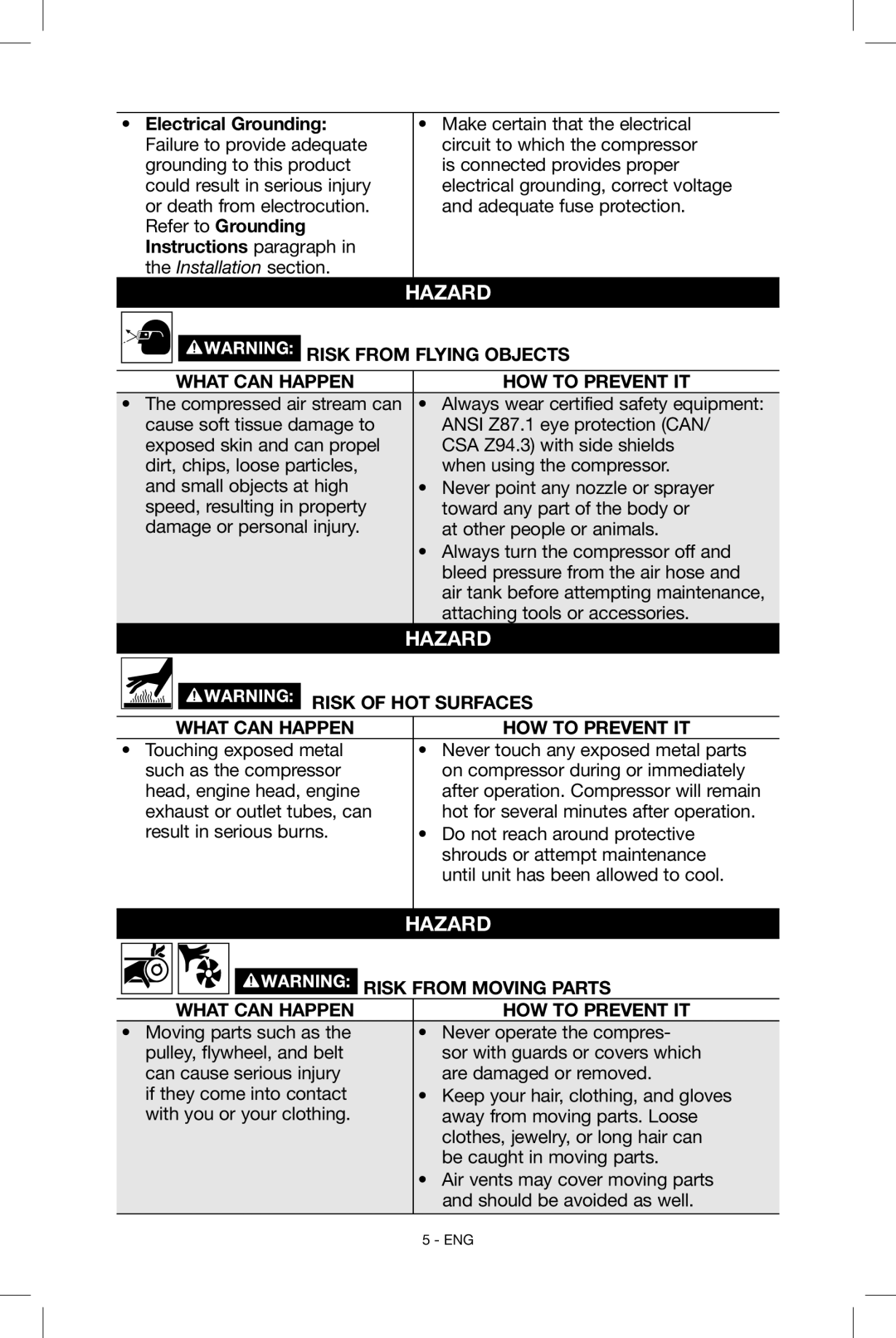
•Electrical Grounding: Failure to provide adequate grounding to this product could result in serious injury or death from electrocution. Refer to Grounding Instructions paragraph in the Installation section.
•Make certain that the electrical circuit to which the compressor is connected provides proper electrical grounding, correct voltage and adequate fuse protection.
|
|
|
|
|
|
| HAZARD |
|
|
|
|
|
|
| |
|
|
|
|
|
| Risk from Flying Objects | |
|
|
|
|
|
| ||
|
|
|
|
|
| ||
|
|
|
|
|
| ||
|
|
|
|
|
| ||
|
|
|
|
|
|
|
|
|
| What can happen | How to prevent it | ||||
| • The compressed air stream can | • Always wear certified safety equipment: | |||||
| cause soft tissue damage to | ANSI Z87.1 eye protection (CAN/ | |||||
| exposed skin and can propel | CSA Z94.3) with side shields | |||||
| dirt, chips, loose particles, | when using the compressor. | |||||
| and small objects at high | • Never point any nozzle or sprayer | |||||
| speed, resulting in property | toward any part of the body or | |||||
| damage or personal injury. | at other people or animals. | |||||
•Always turn the compressor off and bleed pressure from the air hose and air tank before attempting maintenance, attaching tools or accessories.
|
|
|
|
|
|
|
|
|
|
|
| HAZARD | |
|
|
|
|
|
|
|
| RISK OF Hot surfaces | |||||
|
|
|
|
|
|
|
| ||||||
|
|
|
|
|
|
|
| ||||||
|
|
|
|
|
|
|
| ||||||
|
|
|
|
|
|
|
| ||||||
|
|
|
|
|
|
|
|
|
|
|
|
|
|
|
| What can happen |
| How to prevent it | |||||||||
| • Touching exposed metal |
| • Never touch any exposed metal parts | ||||||||||
| such as the compressor |
| on compressor during or immediately | ||||||||||
| head, engine head, engine |
| after operation. Compressor will remain | ||||||||||
| exhaust or outlet tubes, can |
| hot for several minutes after operation. | ||||||||||
| result in serious burns. |
| • Do not reach around protective | ||||||||||
|
|
|
|
|
|
|
|
|
|
|
|
| shrouds or attempt maintenance |
|
|
|
|
|
|
|
|
|
|
|
|
| until unit has been allowed to cool. |
|
|
|
|
|
|
|
|
|
|
|
|
|
|
|
|
|
|
|
|
|
|
|
|
|
| HAZARD | |
|
|
|
|
|
|
|
|
|
|
|
| ||
|
|
|
|
|
|
|
|
|
|
| Risk from Moving Parts | ||
|
|
|
|
|
|
|
|
|
|
| |||
|
|
|
|
|
|
|
|
|
|
| |||
|
|
|
|
|
|
|
|
|
|
| |||
|
|
|
|
|
|
|
|
|
|
| |||
|
|
|
|
|
|
|
|
|
|
|
|
|
|
|
| What can happen |
| How to prevent it | |||||||||
| • Moving parts such as the |
| • Never operate the compres- | ||||||||||
| pulley, flywheel, and belt |
| sor with guards or covers which | ||||||||||
| can cause serious injury |
| are damaged or removed. | ||||||||||
| if they come into contact |
| • Keep your hair, clothing, and gloves | ||||||||||
| with you or your clothing. |
| away from moving parts. Loose | ||||||||||
|
|
|
|
|
|
|
|
|
|
|
|
| clothes, jewelry, or long hair can |
|
|
|
|
|
|
|
|
|
|
|
|
| be caught in moving parts. |
•Air vents may cover moving parts and should be avoided as well.
5 - ENG
